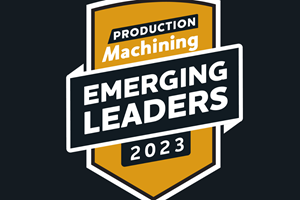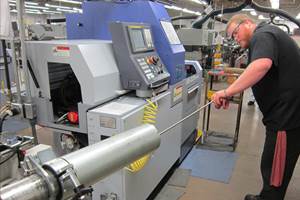Keeping Jobs In North America
Whenever I’ve been asked to go to a trade show or conference, I have always kept one thought in mind: “What will I learn that will help keep manufacturing jobs thriving here in North America?” My attendance at the PMPA’s National Technical Conference helped me understand that despite the many challenges our industry faces, we have a lot to be optimistic about in the precision machining industry.
Whenever I’ve been asked to go to a trade show or conference, I have always kept one thought in mind: “What will I learn that will help keep manufacturing jobs thriving here in North America?” My attendance at the PMPA’s National Technical Conference helped me understand that despite the many challenges our industry faces, we have a lot to be optimistic about in the precision machining industry.
It’s about the people. If we are concerned about keeping the manufacturing jobs filled in North America, the question of “Who are the people in those jobs?” comes instantly to mind. At this year’s conference, 95 first-time attendees—mostly experienced machinists—were attending their first professional conference.
These craftsmen were identified by their companies as having the capability to benefit from the lessons available and also having the potential to help implement those lessons learned back at the shop. The people I met attending this conference make me optimistic about our industry’s future.
What about the technology? The attendees and the exhibitors come to a technical conference to learn about and exhibit the best available and newest technologies. The goal for attendees is to find that “killer application” and bring it back to the shop to make their operation more productive, more capable and, in the end, more profitable. That’s how we will keep manufacturing jobs in North America—by improving our competitiveness one shop at a time.
New developments in gaging technology that debuted at this year’s conference included a novel straightness gaging system that makes possible multiple direct readings over a long aspect ratio part. Another new optical gage also enabled instantaneous computerized capture of multiple measurements and relationship of features on complex parts. That these gages were made by precision machine shops for precision machine shops here in North America also inspires optimism for our industry’s future.
At the after-hours open house at Index Machine in Noblesville, Indiana, attendees were able to see world-class machinery in operation and various stages of proof run. We were fascinated by the vision of two CNC multi-spindle machines integrated by a gantry robot shuttling work between them.
What will they be doing? The National Technical Conference sessions delivered a lot of material on the subject of “Dealing With Change” as people, as companies, as employees and as managers. The material covering the topic of change and change management was featured prominently in the program, from the keynote session through the many individual sessions.
The fact that the sessions covering the topic of management of change were well-attended bodes well for the companies that sent employees and managers. And, it bodes well for the competitiveness of our industry.
Sustainability has made it to the top of everybody’s short list. The “Going Green, Saving Green” session gave many attendees their first “I can do this” peek at this critical area. Presented as a key to profitability rather than politics, this session received high marks. Its lesson: Attendees are “surrounded by opportunities to save money through becoming more environmentally responsible.”
New ways to look at our machining processes. Getting better uptime on our machines through the better understanding of tools and predicting their failure modes taught all attendees how to be more competitive. Getting better productivity by applying radical new drill technologies is another lesson they learned.
A session on understanding our processes through statistically based capability studies gave one more way for attendees to have more confidence in their processes and their products.
Precision machining shops face a host of global challenges. Currency issues, trade, materials availability, energy and sustainability are only a few of the barriers we all face in trying to keep manufacturing jobs thriving in North America.
But the prospects for manufacturing in North America are looking bright based on the people, tech-nologies and techniques that were presented at the conference this year. “Pole Position For Peak Performance” was the theme of the conference, and that theme might well be the forecast for our North American precision machining industry in the years ahead.
Related Content
Recognizing Signs of a Degrading Workplace Culture
Is your machine shop missing key “culture elements?” Here are ways to identify if your organization is heading in the right or wrong direction in terms of establishing a healthy company culture.
Read More2023 Emerging Leaders Strengthen Their Staffs, Solve Problems
Superb critical thinking, top-notch leadership skills and a passion for building a strong team are a few of the common traits held by this year’s five Production Machining Emerging Leader award winners.
Read MoreCNC Machine Shop Employment Positions to Consider Beyond Machine Operators
Many machine shops have open machine operator positions to fill. But does it make sense for shops to also seek automation engineers, IT managers and assembly personnel?
Read More6 Tips for Training on a Swiss-Type Lathe
There are nuances to training a person to effectively operate a Swiss-type lathe. A shop I visited a while back offers some suggestions.
Read MoreRead Next
A Tooling Workshop Worth a Visit
Marubeni Citizen-Cincom’s tooling and accessory workshop offers a chance to learn more about ancillary devices that can boost machining efficiency and capability.
Read MoreDo You Have Single Points of Failure?
Plans need to be in place before a catastrophic event occurs.
Read More5 Aspects of PMTS I Appreciate
The three-day edition of the 2025 Precision Machining Technology Show kicks off at the start of April. I’ll be there, and here are some reasons why.
Read More





















